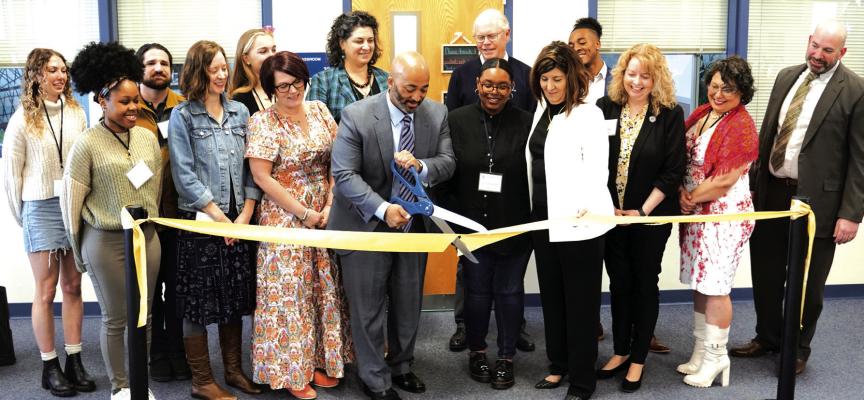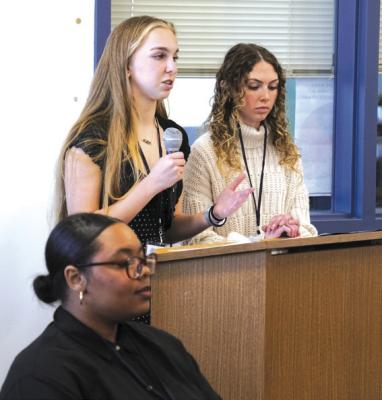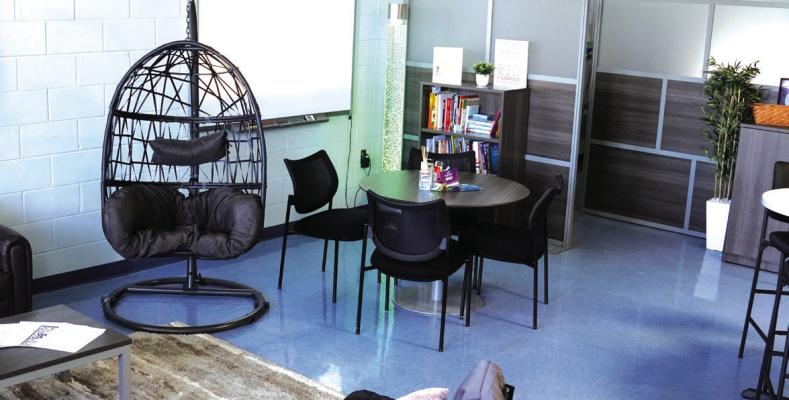New CHS Wellness Center Opens
HOPE IS HERE: The Collingswood school district held a special ceremony for its new mental health wellness center at CHS this week. Superintendent Dr. Fredrick McDowell did the honor of cutting the ribbon, while senior Chloe Wright, and other students, spoke about the need for wellness services for students. The space is designed to welcome students in need of services and assistance.
Mere hours after winter officially expired, the Collingswood school district made good on its December promise to get the new mental health wellness center up and running in the high school by springtime.
On Tuesday morning, superintendent Dr. Fredrick McDowell put scissors to the blue ribbon in front of a school administrators, borough officials, and former county commissioner Carmen Rodriguez, now Camden County’s executive schools superintendent.
McDowell pledged that the wellness center would be centered on making all students feel “safe and secure” at the high school. He thanked borough officials, including mayor Jim Maley, for their help and partnership to improve the mental health of youth in the community. Town and school officials, he said, are coordinating efforts beyond school grounds.
The center is designed to be a safe space for students to go to self-soothe during the school day, perhaps helping to prevent incidents like the vicious December 21 lunchroom attack on a student that sent that student and a teacher who tried to break up the attack to the hospital with injuries, while other students stood around videoing the incident on their phones.
“We’re targeting students whose significant social, emotional, or behavioral challenges are impacting their current academic functioning,” Dr. Karen Principato, the district’s supervisor for grants, professional development, and special projects, wrote in the successful grant application.
Students won’t just be referred to the center, which is located in a former classroom in the school library. Youth will be encouraged to make self-referrals for the confidential services.
The number of students needing mental health support skyrocketed during the pandemic, here as well as nationally. The district’s chronically-absent students (students who miss more than 30 school days a year) jumped up 26 percent; nationally, 37 percent of students enrolled in public and private schools reported their mental health was not good during most or all of the pandemic. Collingswood enrolls approximately 900 high-school students from Collingswood, Oaklyn and Woodlynne, and 400 middle school students from Collingswood and Oaklyn.
Several current students attested to the need for the wellness center. Senior Chloe Wright noted that her class attended the high school “before, during and after the pandemic.” As an honor student pre-pandemic she found she “couldn’t even log on to class” during the pandemic lockdown. The majority of the student body now, she noted, were ripped out of class during their middle school years putting extraordinary stress and pressure on them in circumstances where they were largely on their own. These younger students “were expected to pick it right back up last year and be perfectly fine this year. It was an unrealistic expectation.”
Notably, signs of rising mental health stresses among youth were already present before the pandemic. McDowell remarked that the wellness center founding arose from district efforts that started before COVID made an unwelcome entrance and exacerbated the issue.
Rodriguez stressed the importance of the free service to the student body, pointing out that while health care in our country is available it is not accessible to all. Making a freely accessible program was a needed step.
The center’s opening – which had a soft opening on March 1 – provided a positive step towards helping young people. Visitors admired the room’s outfitting with a large screen showing a calm sunrise, a pair of old-style egg rockers, plush chairs, and small tables. The district converted the former classroom using funding from the federal Department of Health and Human Services (DHHS) Trauma Informed Care in Schools grant program.
The center is staffed with four new hires: two social workers, one behavioral specialist, and a medical nurse practitioner, whose salaries and benefits are covered for two years by the $1.9 million grant. Four additional employees’ positions are also being funded by the grant, led by project director Kristin O’Lexy, shifting from her position as a district socialwork coordinator, and district multi-tiered system of support coach Rebecca Muller, also shifting from a position as special education teacher. Salaries and benefits for the two years will absorb about 70 percent of the grant monies.
The group’s goal, in addition to helping students get back into class as quickly as possible, is to create a sustainable model for the future, McDowell noted in December at the grant announcement ceremony, so the school can keep the center open in year three and beyond, as the grant could be renewed by the DHHS. “The department will assess the number of students we serve in the two years, and the outcomes, and use those outcomes to measure if we’re making satisfactory progress towards our local goals, such as cutting down on absenteeism and better attention in the classroom,” he said.




